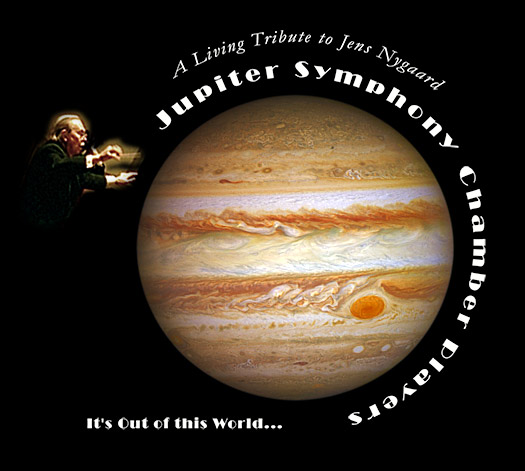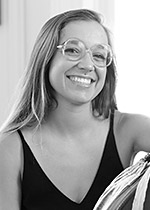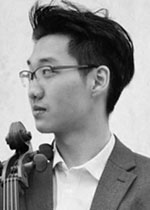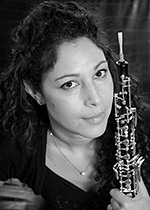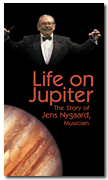Join us for our next concerts...
Monday, February 16 ♦ 2 PM & 7:30 PM
Beethoven’s Sway
Good Shepherd Presbyterian Church
152 West 66 Street (west of Broadway)
Limited Seating
Tickets: $25, $17 ~ Reservations advised
Call (212) 799-1259 or email admin@jupitersymphony.com
Pay by check or cash (exact change)
Michael Stephen Brown piano
Winner of the 2018 Emerging Artist Award from Lincoln Center, a 2015 Avery Fisher Career Grant and the 2010 Concert Artists Guild Competition ~ “working wonders at the keyboard” Chicago Tribune ~ “of compelling artistry and power” Seattle Times
Julian Rhee violin
Won First Prize at the 2020 Elmar Oliveira International Violin Competition, First Prize at the 2018 Johansen Competition, First Prize at the 2018 Aspen Violin Concerto Competition, Second Prize at the 2018 Irving Klein competition, 2018 Presidential Scholar in the Arts, Gold Medals at the Fischoff and M-Prize competitions, and First Prize at the 2018 Barnett and 2018 Rembrandt chamber music competitions (playing both violin & viola)
Maurycy Banaszek viola
Winner of numerous violin, viola and chamber
music awards
Christine Lamprea cello
First Prize winner of the Sphinx and Schadt competitions, winner of the 2013 Astral Artists’ Auditions and recipient of an award from the National Foundation for Advancement in the Arts ~ praised by the Boston Musical Intelligencer for her “supreme panache and charmingly effortless phrasing”
Marguerite Cox double bass
Appeared as soloist on Illuminate Women’s Music, New Music Festival, Bass Players for Black Composers, and Sound Off: Music for Bail ~ as guest principal bass, she has played with the Chamber Orchestra of Philadelphia and Charleston Symphony
Vadim Lando clarinet
Winner of the CMC Canada, Yale and Stonybrook competitions ~ “consistently
distinguished...vibrant, precise, virtuosic playing” The New York Times
Karl Kramer horn
Winner of the 1997 and 1999 American Horn
competitions ~ “a prominent, perilously chromatic horn line, which Karl Kramer played beautifully.” The New York
Times
Gina Cuffari bassoon
Principal Bassoonist of the Orpheus Chamber Orchestra, praised for her “sound that is by turns sensuous, lyric,
and fast moving” Palm Beach Daily News
Fritz KREISLER Rondino on a Theme by Beethoven
~ in pure Kreisler style, a colorful and lively duo for violin and piano based on an abandoned theme from the rejected final movement of the Wind Octet in Eb Major written in 1793
Kreisler himself explained for the Victor Record Catalog, “This theme consists of only eight measures, which occurs in a very early and unimportant composition by Beethoven, now quite forgotten. The little theme itself is of indescribable charm and its rhythm is of such alluring piquancy that it grows by every repetition. In order to set this peculiarity off to advantage, I conceived the idea of writing a rondo around it, the rondo being a form of composition where a short tune returns obstinately in more or less regular intervals. Rondino means ‘little rondo.’ I have tried to keep the old classic style throughout the little piece, and I hope I have succeeded.” The Rondino was dedicated to his colleague, Mischa Elman, the Ukrainian-born Jewish-American violinist.
Kreisler’s deep respect for Beethoven is evident in his dedicated performances and interpretation of his works for the violin. He wrote 3 cadenzas for the Violin Concerto (one for each movement), and he edited and published the complete violin and piano sonatas of Beethoven, adding his own editorial markings. His interpretations of the Violin Concerto and Sonatas are recognized for their unique expressiveness and distinct style; his recordings of these are also notable.
Kreisler (1875–1962) is regarded as one of the greatest violinists of all time. He was unique in playing with a tone of indescribable sweetness and expressiveness, and his style is reminiscent of the gemütlich lifestyle of prewar Vienna. Born in Vienna, Kreisler began to learn the violin at age 4 with his father, a doctor and enthusiastic amateur violinist. At age 7 he was the youngest ever to enter the Vienna Conservatory, where he studied violin for 3 years with Joseph Hellmesberger and theory with Anton Bruckner. He won a gold medal at age 10, an unprecedented distinction. He then studied composition and violin at the Paris Conservatoire. After a successful concert tour in the United States in 1888–1889, he returned to Vienna to study medicine. Then he studied art in Paris and Rome and served as an officer in the Austrian army. In 1899 he resumed concertizing and became one of the most successful virtuosos of his time. In 1910 Kreisler premiered Edward Elgar’s Violin Concerto (dedicated to him) with the London Symphony Orchestra and Elgar conducting; it was a triumph. After 1915 he lived mainly in the United States but continued to tour widely in Europe. In 1941 he was struck by a truck in New York City and nearly died from the injuries; although he recovered, his playing and hearing were never the same. He died in New York in 1962.
Archduke RUDLOPH of Austria Septet in E minor
~ elegant, early Romanticism with appealing melodies—for clarinet, horn, bassoon, violin, viola, cello, and double bass
The Septet is attributed to Erzherzog Rudolph von Österreich (Archduke Rudolph). Passionate about music, he was an amateur composer whose works were frequently performed in his day, an important patron (and the only composition pupil) of Beethoven, and a collector. Scholars are divided on the authorship, and some sources cite the later date noted on the manuscript (1850). German musicologist Michael Kube, for one, attributes the Septet to Rudolph and dates it to 1830, according to Grove Music Online; American musicologist Susan Kagan calls this attribution into question. The manuscript copy is located at the Österreichische Nationalbibliothek in Vienna.
Archduke Rudolph was Beethoven’s greatest patron. Born in the Pitti Palace in Florence in 1788, he was the youngest son of Emperor Leopold II and youngest brother of Emperor Franz II. “As brother of the Emperor, Rudolph was able to gain access for Beethoven to the highest salons in Vienna. Rudolph was himself a first-class musician. He was an excellent pianist and competent composer. He was the only pupil Beethoven ever took on as student of composition…. In 1809, when Beethoven accepted an invitation from King Jerome of Westphalia (brother of Napoleon Bonaparte) to become Kapellmeister at the court in Kassel, Archduke Rudolph persuaded Prince Lobkowitz and Prince Kinsky that they should pay Beethoven a guaranteed annual salary of 4000 florins—Rudolph contributing 1500 fl., Lobkowitz 700 fl., Kinsky 1800 fl.—on the sole condition that he abandon plans to move to Kassel and remain resident in Vienna for the rest of his life. Beethoven agreed. Then, after the Austrian currency was devalued fivefold in 1811, Kinsky was thrown from his horse and died in 1812, and Lobkowitz went bankrupt and was forced to flee from Vienna in 1813. Archduke Rudolph increased his payment at each stage to ensure Beethoven did not suffer financially. In gratitude, Beethoven dedicated far more compositions to Rudolph than to anyone else [14 in all]—including the Fourth and Fifth (Emperor) Piano Concertos, the Piano Sonatas ‘Les Adieux,’ Hammerklavier and opus III, the Violin Sonata opus 96, the Archduke Piano Trio (named for Rudolph), the Missa Solemnis and the Grosse Fuge. ‘Les Adieux’ was specifically composed for Rudolph when he and the Imperial royal family were forced to leave Vienna in the face of the advancing French army in 1809. The first movement—Das Lebewohl [the Farewell]—was composed before Rudolph left; the second—Die Abwesenheit [the Absence]—was composed during his exile. Beethoven told him he would not compose the third and final movement—Das Wiedersehen, [the Welcome Home]—until the Archduke returned to Vienna, which he duly did in 1810. Archduke Rudolph asked Beethoven in March 1819 to compose a piece to be played at his enthronement as Archbishop of Olmütz a year later. Beethoven embarked on the mighty sacred work, Missa Solemnis, which he didn’t complete until 1823—three years after Rudolph’s enthronement! Archduke Rudolph was an epileptic [like many of the Hapsburgs] and sickly man; original plans for him to join the army were abandoned in favour of a less strenuous career in the church. He died at the early age of 43 [in 1831], only four years after his great idol, Beethoven. He ordered that his heart should be removed from his body and placed in a niche of the cathedral at Olmütz [today’s Olomouc], and that his body should be buried in the Imperial vault at St Stephen’s Cathedral in Vienna [Classicfm].”
As Beethoven’s only composition pupil Rudolf wrote, over a period of 2 decades of study, a number of respectable compositions—for piano, chamber ensemble, and voice. They were composed within the forms and harmonic language of the period, but with impressive lyricism. His earliest dated work is from 1810; and several of the autograph manuscripts bear corrections, suggestions, and emendations in Beethoven’s hand. Kagan asserts that “A notable feature of his style is a strong lyrical bent, a predilection for arching melodic lines and decorative filigree, especially in the slow movements, that foreshadow the music of Romantic composers of the following generation…. That Beethoven left an imprint on Rudolph’s music is not surprising, considering the powerful nature of Beethoven’s personality and the absolute veneration Rudolph felt for his teacher. However, the actual manifestations of Beethoven’s teaching, seen in those manuscripts in which he made corrections, indicate that for the most part, he allowed the Archduke to develop his compositional ideas quite independently.” Rudolph was one of 50 composers Anton Diabelli invited to write a variation on a waltz tune by Diabelli for a publication entitled Vaterländischer Künstlerverein. Rudolph’s variation, while not as widely celebrated as Beethoven’s, is notable as it was included in the anthology alongside Beethoven’s monumental Diabelli Variations Op. 120. In fact, Rudolph’s variation was published anonymously and identified as “S.R.D.” (Serenissimus Rudolfus Dux).
Rudolph’s enthusiasm for music also inspired him to amass a vast library of music, which he made available to Beethoven early in their acquaintance. He began collecting music scores and books about music at age 13. Today, his collection of 18,000 works from 2400 composers is housed at the Gesellschaft der Musikfreunde (Society of Friends of Music) in Vienna, as are the letters written by Beethoven to Rudolph.
The Archduke’s talent as a pianist manifested itself in his teens, when he was performing in aristocratic salons at age 15. Under Beethoven’s tutelage, he improved noticeably. When Beethoven’s Violin Sonata Op. 96 was premiered on 29 December 1812 by the renowned French virtuoso violinist Pierre Rode, accompanied by Rudolph, a critical observer wrote, “the performance as a whole was good, but we must mention that the piano part was played far better, more in accordance with the spirit of the piece, and with more feeling than that of the violin.” Beethoven also was not satisfied. Apparently, even before Rode’s arrival in Vienna, a deterioration in his playing had been noticed. Furthermore, Rode did not study the violin part of the Sonata and treated the occasion too casually.
BEETHOVEN Piano Trio No. 7 in Bb Major “Archduke” Op. 97
~ of sweeping grandeur and infinite beauty
“Arguably the finest trio for violin, cello, and piano ever written, it begins marvelously and expansively with an unforgettable, glorious melody that immediately establishes its nobility. This broad stroke sets the tone for the entire piece, a monumental work of larger-than-life architecture in which thoughts develop organically and unhurriedly,” explained the astute critic Fred Kirshnit. It was dedicated to his pupil, the Archduke Rudolph of Austria, hence its moniker. The premiere, which was part of a charity concert, took place on 11 April 1814 at a hotel in Vienna. Beethoven played with violinist Ignaz Schuppanzigh and cellist Joseph Linke. It was one of Beethoven’s final concert appearances as a performer, as his increasing deafness made it impossible for him to continue playing. Schuppanzigh, Beethoven’s lifelong friend and the leader of Prince Lichnowsky’s private String Quartet, premiered many of Beethoven’s string quartets and is regarded as the pioneer of public string quartet concerts. Linke was a member of the Schuppanzigh Quartet. |
|
Monday, March 2 ♦ 2 PM & 7:30 PM
Greatest Wunderkinder
Good Shepherd Presbyterian Church
152 West 66 Street (west of Broadway)
Limited Seating
Tickets: $25, $17 ~ Reservations advised
Call (212) 799-1259 or email admin@jupitersymphony.com
Pay by check or cash (exact change)
Janice Carissa piano
Gilmore Young Artist , Young Scholar of the Lang Lang Foundation, recipient of the 2018 Salon de Virtuosi Grant, winner of the 2014 piano competition at the Aspen Festival, Star Performance Award of the 2012 American Protégé Music Talent Competition in New York, and a top prizewinner of the IBLA Foundation’s 2006 piano competition (at age 8) ~ praised for “the multicolored highlights of a mature pianist” Philadelphia Inquirer ~ “fleet-fingered touch that is particularly impressive” Chicago Classical Review
Oliver Neubauer violin
Recipient of the Gold Award at the 2018 National YoungArts Competition and winner of the 2017 Young Musicians Competition at the Chamber Music Society of Lincoln Center
Rosemary Nelis viola
Recipient of a Kovner Fellowship, she has performed chamber music at Yellow Barn, Bard Music Festival and Kneisel Hall
Robin Park cello
Won First Prize at the 5th Mahler Cello Competition and 2023 Princeton University Concerto Competition, and Grand Prize at the 2018 Caprio and Sinfonietta Nova competitions
Roni Gal-Ed oboe
First Prize winner of the Lauschmann Oboe Competition in Mannheim ~ “Outstanding” The New York Times
Vadim Lando clarinet
Winner of the CMC Canada, Yale and Stonybrook competitions ~ “consistently
distinguished...vibrant, precise, virtuosic playing” The New York Times
The 4 greatest musical prodigies in history were Mozart, Mendelssohn, Saint-Saëns, and Korngold. Mozart was the most gifted prodigy in the Classical era. The genius began playing the harpsichord around the age of 4 and was composing music by 5. When he died at age 35 he had composed over 600 pieces. Mendelssohn is regarded as the greatest composing prodigy, whose command at age 16 surpassed that of Mozart; he composed works at age 15, 16, and 17 that are considered masterpieces. The bourgeois genius was also a Renaissance man, being a linguist, literary connoisseur, and artist. The esteemed critic Harold Schonberg opined that “It is not generally realized that Saint-Saëns was probably the most awesome child prodigy in the history of music. His I.Q. must have soared far beyond any means of measurement. Consider: at 2 1/2 he was picking out tunes on the piano. Naturally he had absolute pitch. He also could read and write before he was three. At three he composed his first piece…. At five he was deep in analysis of Don Giovanni, using not the piano reduction but the full score. At that age he also gave a few public performances as a pianist. At seven he was reading Latin…. he made his official debut at ten. As an encore at his debut recital he offered to play any of Beethoven’s thirty-two sonatas from memory…. Saint-Saëns had total recall. If he read a book or heard a piece of music it was forever in his memory.” (Read Schonberg’s The Lives of the Great Composers to discover more about this amazing composer.) Korngold, likewise, had exceptional musical talent and early achievements as a composer (see his brief biography below).
MOZART Oboe Quartet in F Major K. 370
~ traverses a range of emotions in a blend of virtuosity, melodic beauty, and expressive depth
The excellent Quartet was composed early in the year for Friedrich Ramm, a friend and renowned virtuoso oboist of the Electoral Court Orchestra in Munich, where Mozart had gone to complete his opera Idomeneo for its premiere. The Quartet was not only a showpiece for Ramm, but it also revealed the improvements that had been made to the oboe at that time. In John Burk’s view, Mozart “obviously put his best efforts into it, for he both expected a first-rate performance and valued Ramm’s regard for his own abilities. The score puts the soloist through his paces…. The string writing shows that Mozart had not forgotten how to write string quartets although he had long left them untouched. The string trio has no mere accompanying function…—it is a concertante partner throughout….”
Erich Wolfgang KORNGOLD Suite from the Incidental Music for Shakespeare’s Much Ado About Nothing Op. 11
~ 4 brilliant pieces—imaginative, alluring, and with beautiful melodies—for violin and piano
“The Maiden in the Bridal Chamber” depicts Hero, the bride-to-be, on her wedding morning, happily unaware that Claudio was tricked into doubting her fidelity.
“Dogberry and Verges—March of the Watch”—is a mock serious march for Dogberry (the pompous constable), his crony Verges, and the other men of the watch.
The Romantic waltz for “Scene in the Garden” unfolds as Beatrice and Benedick fall in love and another couple in the bushes confess their love for one another.
The “Masquerade and Hornpipe” portray a lively banter in a masked ball and a lively dance.
Written when Korngold was 23, the Incidental Music was performed regularly all over Europe. It was composed for a production of the play in German under the title Viel Lärmen um Nichts, and staged at the Schönbrunn Palace in Vienna on 20 May 1920. Scored originally for chamber orchestra, Korngold arranged Much Ado for violin and piano when the run of performances was extended but no orchestra was available. He himself played the piano part.
Korngold was born to a Jewish family in 1897 in Brünn, Austria-Hungary (today’s Brno, Czechia). Strongly influenced by his music-critic father, Julius Korngold, the phenomenal prodigy composer was playing 4-hand piano arrangements with his father at age 5. He could apparently reproduce any melody he heard and began composing at the age of 7, but seriously around 10 years of age. “In 1907 he played his cantata Gold to Mahler, who pronounced him a genius and recommended that he be sent to Zemlinsky for tuition. At the age of 11 he composed the ballet Der Schneemann, which caused a sensation when it was first performed at the Vienna Court Opera (1910), and he followed this with a Piano Trio and a remarkable Piano Sonata in E that so impressed Schnabel that he championed the work all over Europe. Of his first orchestral work, the Schauspiel Ouvertüre and the Sinfonietta (1912), Strauss remarked: ‘…it is really amazing’, while Puccini was similarly impressed by his opera Violanta (1916). His early fame reached its height with the appearance of his operatic masterpiece, Die tote Stadt, composed when he was 20 and acclaimed the world over after its dual premiere in Hamburg and Cologne (1920) [New Grove Dictionary].” In 1928 a poll by the Neue Wiener Tagblatt determined that Korngold and Arnold Schoenberg were the greatest living composers. In 1934 Korngold went to Hollywood to write music for films and to escape the growing threat of the Nazi regime. (During the war, his house in Vienna was confiscated by the Nazis.) He became one of the preeminent composers of Hollywood’s “golden age”—two of his 16 symphonic scores won Oscars: Robin Hood and Anthony Adverse. After the war, Korngold’s compositions for the concert hall included a Violin Concerto premiered by Jascha Heifetz and a Symphonic Serenade premiered by the Vienna Philharmonic and conductor Wilhelm Fürtwangler. Toward the end of his life, his popularity waned with changing trends. The critic Karl Schumann saw Korngold as a weary man “who had been through emigration and the mill of the film studio…. In the end, he died [in 1957]…more so of a broken heart. He never reconciled himself to the fact of his expulsion from Vienna, from the good old days, from the fin-de siècle atmosphere, art nouveau, symbolism, the cult of music, worship of the opera, and the coffeehouse.” He was buried in Forever Hollywood Cemetery.
MENDELSSOHN Clarinet Sonata in Eb Major MWV Q
~ written at age 15, with lyrical lines for the clarinet and florid, rhapsodic passages for the piano
The Sonata was written on commission by a family friend, the Dresden banker and patron Baron Karl von Kaskel, who was also friends with Giacomo Meyerbeer and Richard Wagner. This is documented by Mendelssohn’s letter dated 6 May 1824: “I beg your pardon, my dear Kaskel, for being so late at keeping my promise. I have a great deal to do this winter and a sonata for piano and clarinet is not the easiest of all tasks. I know only too well that I have solved the problem very badly, but it would still be worse if I had written it without sufficient thought, and I must apologize again for the long delay and for the mediocrity of the sonata, but I know that you will not judge it too harshly for if you had wanted a really good sonata you would not have come to me. As I am not barren of poetic ideas I say this complainingly and not to excuse myself….” One may assume that Kaskel was an amateur clarinetist of modest ability as the clarinet part is not written for a virtuoso.
A manuscript copy which bears the date “d. 17 April” is owned by the Deutsche Staatsbibliothek Berlin; and the first page shows part of Mendelssohn’s fervent prayer, “L. e. g. G.” (Lass es gelingen, Gott! – Let it be successful, Lord!). The autograph copy is owned by the Pierpont Morgan Library in New York. The date suggests that the Sonata was written just before Mendelssohn’s Sextet Op. 110, which was composed between April 28 and May 10. Both works were not published in Mendelssohn’s lifetime (the Sonata was eventually published in 1987). Around this time, Mendelssohn was also working on Act 1 of a comic opera, Die Hochzeit des Camacho. Before writing the Sonata, Mendelssohn had already written 13 string symphonies and a number of chamber works, and in March of 1824, he completed his first symphony for full orchestra. His musical education included the study of works by Haydn and Mozart, the counterpoint of Bach and Handel, as well as the music of his contemporaries, most notably Beethoven and Carl Maria von Weber.
Camille SAINT-SAËNS Piano Trio No. 2 in E minor Op. 92
~ a pièce de resistance on a grand scale, its outer movements magisterial in demeanor and scintillating with excitement, its middle movements imbued with freshness and blessed with a wistful Andante
Written in the spring of 1892, the Second Piano Trio reveals Saint-Saëns’s mastery of the genre. Its dazzling ride through 5 movements lives up to his remark that he lives in music “like a fish in water.” Robert Philip, writing for Hyperion Records, described the remarkable work: “The opening is one of Saint-Saëns’s most telling inspirations. The piano plays a pattern of repeated chords, rising and falling in a wave, and marked ‘very lightly’ (extremely difficult to achieve on the modern concert grand). Over this pattern, alternating violin and cello float a sombre melody…only Saint-Saëns could have combined such a broad and intense melody with such delicate and airy piano-writing. [The 2nd movement, an] irregular minuet…demonstrates how to write a movement in five-time that sounds entirely natural…. The slow movement is brief, simple and heartfelt…. The fourth movement, like the second, is a…fast waltz…the finale returns to the grand scale of the first…highly contrapuntal, almost ecclesiastical in feel …. We could almost be back in the organ loft of La Madeleine, with a virtuoso pedal solo, and as the tension mounts Saint-Saëns brings the work to an end in a mood of powerful determination.”
Saint-Saëns was born in Paris in 1835. Although he was frail and tubercular as a child, he lived till the age of 86, when he died in Algiers. The child prodigy was first taught the piano at the age of two and a half years old by his mother’s aunt. Following studies with other teachers, he entered the Paris Conservatoire in 1848. After attending organ classes and winning a second prix in 1849 and a brilliant premier prix in 1851, he began formal composition studies with Fromental Halévy, a protégé of Cherubini. In 1857 he became organist at the Madeleine, a post he held for 20 years. Liszt, whom he met about this time and with whom he formed an enduring friendship, called him the greatest organist in the world. From 1861 to 1865 he was professor of piano at the Niedermeyer School, where his pupils included Gabriel Fauré. During his heyday, Saint-Saëns was a progressive force and founded, with Romain Bussine, the Société Nationale de Musique in 1871. Its purpose was to give new music by French composers a hearing, which it did, for many years until about 1900. In 1888, Saint-Saëns suffered a crushing blow with the death of his mother, whom he loved with a passion. From then on, with no family left in Paris, he became a nomad, traveling ceaselessly and widely, either on long concert tours or on holiday. Among his favorite resorts was Algeria, where he composed the Second Piano Trio. |
Jupiter 2025 - 2026 Season
20 Mondays at 2:00 PM & 7:30 PM
Good Shepherd Church ♦ 152 West 66 Street
View
Our Season Calendar
Tickets: $25, $17 ~ Reservation advised
Call (212) 799-1259 or email admin@jupitersymphony.com
Pay by check or cash (exact change)
Please visit our Media Page to hear Audio Recordings from the Jens Nygaard and Jupiter Symphony Archive
Concert Venue:
Good Shepherd Presbyterian Church
152 West 66 Street (west of Broadway), New York
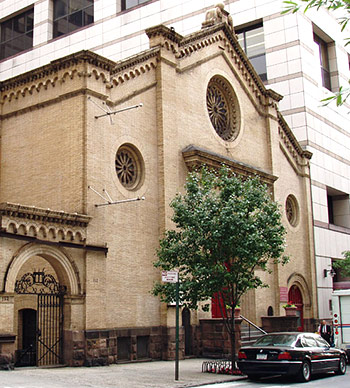
“one of the most refined and intelligent church spaces in New York” ~ The New York Times
Built in 1893 by Josiah Cleveland Cady, architect of the old Metropolitan Opera House and the American Museum of Natural History
|
Office Address:
JUPITER SYMPHONY
155 West 68th Street, Suite 319
New York, NY 10023
admin@jupitersymphony.com
(212) 799-1259
 
Like our Facebook page to see photos, videos,
concert information and the latest news
Jupiter in the News
ConcertoNet
“knocked the socks off this listener...It was wondrous chamber music. And the three artists gave it the deserving excitement, volition and imagination.”
Harry Rolnick, ConcertoNet more...

“the performers were top notch”
“The homey church where these concerts take place, nestled on West 66th Street in the shadow of Lincoln Center, is an intimate and acoustically vibrant place for chamber music.”
Anthony Tommasini, The New York Times more...
Strad Magazine
“A finely forthright, fluent and expressive account of Haydn's Divertimento in E-flat major opened this programme of miscellaneous chamber music in a series known for adventurous programming.”
Dennis Rooney, Strad Magazine more...
ConcertoNet
“Mr.
Nygaard’s cadenza flowed down Mozart lanes and paths, each with
beautiful backgrounds. And at the very end, Mr. Nygaard brought forth
that martial major theme, like an unexpected gift.”
Harry Rolnick, ConcertoNet more...
|
As promised, here are the videos of John Field’s Divertissement No. 1 and Sir Hamilton Harty’s Piano Quintet. Fortuitously, our Jupiter musicians had the good sense to record the rehearsal in an impromptu decision, literally minutes before pressing the record button. Pianist Mackenzie Melemed (replacing Roman Rabinovich at the last minute) learned the music in 2 days! Bravo to him.
Both works are Irish rarities that were scheduled for the March 16 performances which had to be canceled because of the coronavirus epidemic. Even though the entire program could not be recorded because of technical issues, we are pleased to be able to share with you the 2 musical gems. Enjoy.
John FIELD Divertissement No. 1 H. 13
~ simply delicious piano quintet, alternately titled Rondeau Pastoral and better known in its version for solo piano, Twelve O’clock Rondo, on account of the 12 “chimes” at the end ~ by the creator of the Nocturne, which had a major influence on Chopin
We thank the University of Illinois (Champaign) for a copy of the Divertissement music.
Mackenzie Melemed piano
Abigel Kralik violin
Dechopol Kowintaweewat violin
Sarah Sung viola
Christine Lamprea cello
Sir Hamilton HARTY Piano Quintet in F Major Op. 12
~ in a lyrical Romantic idiom, with a distinct, breezy Irish-salted voice
Andrew Clements of the Guardian proclaimed the beautiful Quintet “a real discovery: a big, bold statement full of striking melodic ideas and intriguing harmonic shifts, which adds Brahms and Dvořák into Harty’s stylistic mix, together with Tchaikovsky in some passages.” There’s folk music charm as well, reminiscent of Percy Grainger—notably in the Scherzo (Vivace) with its folksy quirks and nonchalance, and the winding, pentatonic melody in the Lento.
Our gratitude to the Queen’s University Library in Belfast, Northern Ireland, for a copy of the autograph manuscript of the music. Much thanks, too, to Connor Brown for speedily creating a printed score and parts from Harty’s manuscript.
Mackenzie Melemed piano
Abigel Kralik violin
Dechopol Kowintaweewat violin
Sarah Sun viola
Christine Lamprea cello
I Allegro 0:00
II Vivace 10:43
III Lento 14:44
IV Allegro con brio 23:59
|
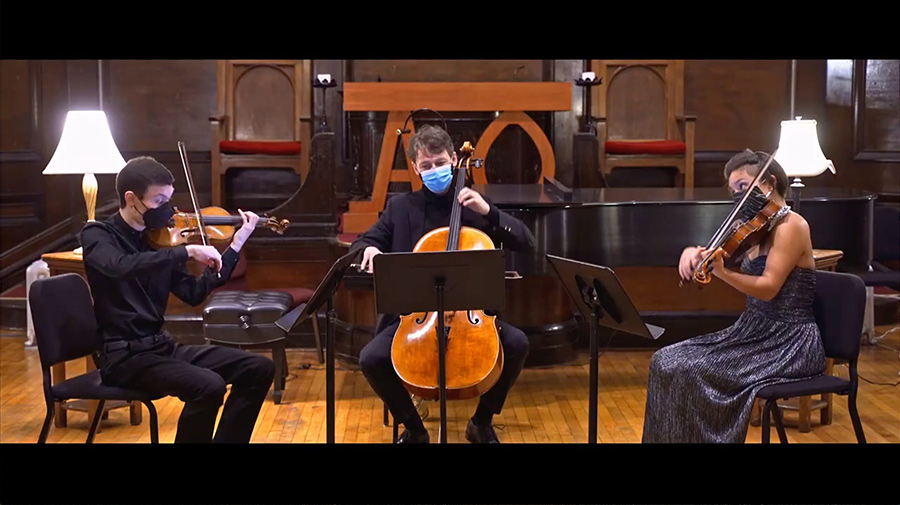
Oliver Neubauer violin, Mihai Marica cello, Zoe Martin-Doike viola
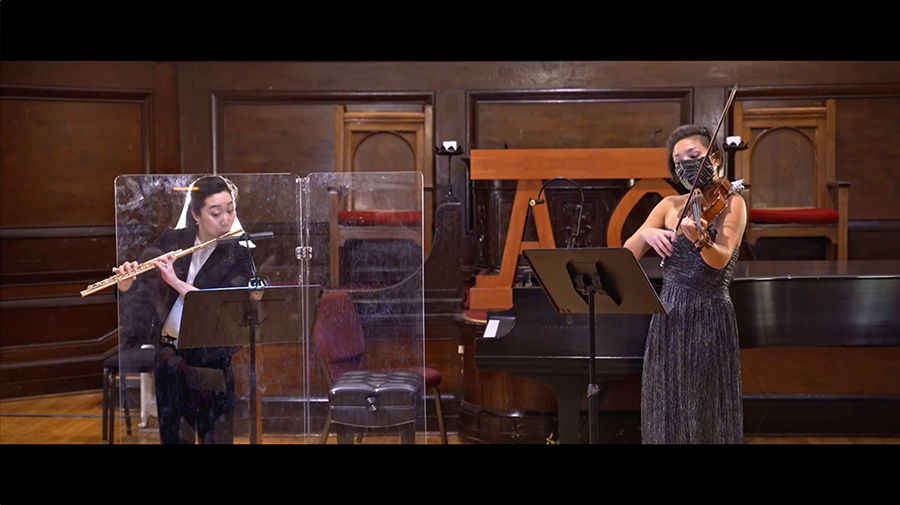
Sooyun Kim flute, Zoe Martin-Doike viola
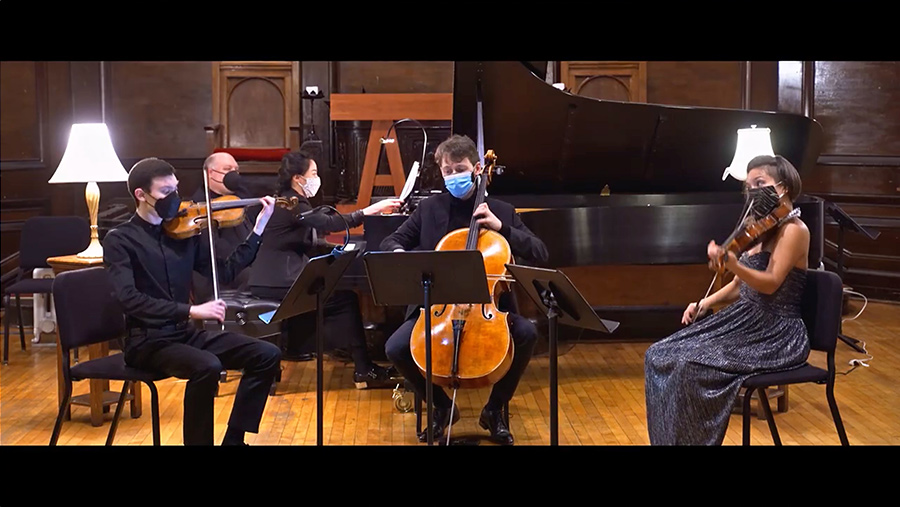
Oliver Neubauer violin, Janice Carissa piano
Mihai Marica cello, Zoe Martin-Doike viola
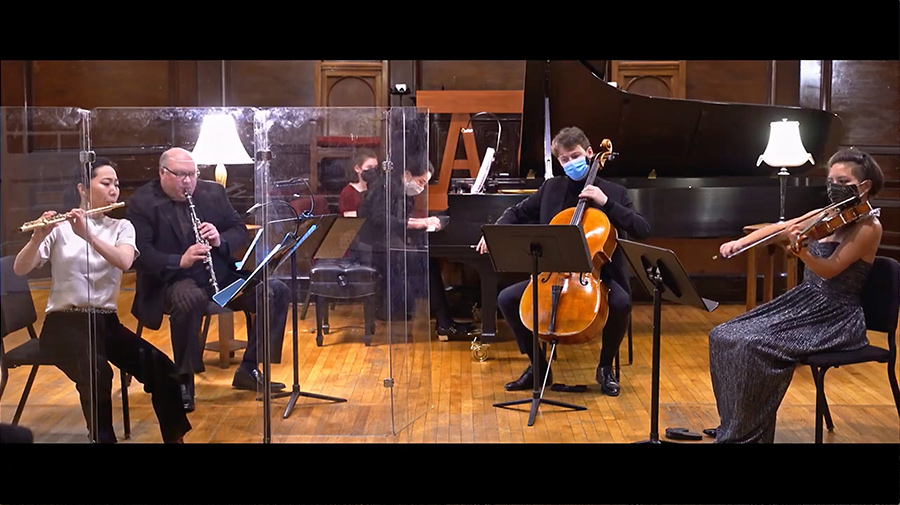
Sooyun Kim flute, Vadim Lando clarinet, Janice Carissa piano
Mihai Marica cello, Zoe Martin-Doike viola
|
Video Viewing ~ Classical Treats
February 8, 2021 Jupiter Concert
Greetings! Three months ago, our musicians brought warmth and joy with their wonderful music making on a cold, winter’s day with Classical Treats. The viewing is offered for $25, and we hope to cover the costs of production. Thanks so much for viewing the video of this concert, and for supporting Jupiter with gifts as well! MeiYing
View the video for $25
You will be automatically directed to the video page once payment is made. If not, click on the “return to merchant” link after checkout. Please go through the checkout process only once and do not use the back button or reload the page while making the purchase. If there are any problems, contact jupiternews@jupitersymphony.com.
Viewers comments of previous videos:
“Oh I thoroughly enjoyed the concert. Good to see Maxim and his dad. Familiar faces to me. I enjoyed the notes about the players. Till the next time...”
“Great playing and really nice camera work. Probably better than being there!”
“We so enjoyed the concert. The pianist was outstanding as was the musical selection.”
“It was wonderful. Thank you.”
♦ ♦ ♦
Musicians
Janice Carissa piano
Young Scholar of the Lang Lang Foundation, recipient of the 2018 Salon de Virtuosi Grant, winner of the 2014 piano competition at the Aspen Festival, and a top prizewinner of the IBLA Foundation’s 2006 piano competition (at age 8)
Oliver Neubauer violin
Recipient of the Gold Award at the 2018 National YoungArts Competition and winner of the 2017 Young Musicians Competition at the Chamber Music Society of Lincoln Center
Zoë Martin-Doike viola
Member of the Metropolitan Opera Orchestra, top prizewinner of the Primrose and Lenox competitions on viola and violin, respectively and founding violinist of the Aizuri Quartet
Mihai Marica cello
Winner of the Irving Klein, Viña del Mar, Salon de Virtuosi and Dotzauer competitions ~ “Mihai is a brilliant cellist and interpreter of music. His playing is spellbinding.” Mitchell Sardou Klein
Sooyun Kim flute
Winner of the Georg Solti Foundation Career Grant and a top prize at the ARD flute competition, she has been praised for her “vivid tone colors” by the Oregonian and as a “rare virtuoso of the flute” by Libération
Vadim Lando clarinet
Winner of the CMC Canada, Yale and Stonybrook competitions ~ “consistently
distinguished...vibrant, precise, virtuosic playing” The New York Times
♦ ♦ ♦
Program
HAYDN Sonata No. 1 in G Major Hob XVI:40 ▪ 1784
~ sophisticated and subtly wrought, the Sonata is from a set of 3, arranged for string trio from the original for keyboard and published by Johann André in 1790
The sonatas were written for Princess Marie, the new bride of Prince Nicholas Esterházy, grandson of Haydn’s employer, Prince Nicholas I. Cramer’s Magazin der Musik, in its review in 1785, observed that they were “more difficult to perform than one initially believes. They demand the utmost precision, and much delicacy in performance.” In 2 contrasting movements, the pastoral Allegretto innocente is followed by a gleeful zany romp.
Conradin KREUTZER Quintet in A Major ▪ between 1810 and 1820
~ in the late Classical–early Romantic style, the charming Quintet is written for the unusual combination of piano, flute, clarinet, viola, and cello with the piano as primus inter pares, first among equals—each movement a winner bearing a variety of melodic gifts and revealing a lively feeling for rhythm and color
Born in Messkirch to a respected Swabian burgher, Kreutzer (1780–1849) is considered a minor master of the Biedermeier epoch. He studied law in Freiburg before turning entirely to music after his father died in 1800. In 1804 he went to Vienna, where he met Haydn and probably studied with Albrechtsberger, one of Beethoven’s teachers. His active career included tours in Europe and several posts in Vienna, Stuttgart, Cologne, and other German cities, all the while composing numerous operas. Some of his music is not entirely forgotten—his settings for male chorus to Ludwig Uhland’s poems long remained popular with German and Austrian choirs; Das Nachtlager in Granada used to be revived occasionally in Germany; and his score for Der Verschwender continues to be performed in Austria.
Franz Anton HOFFMEISTER Duo Concertante No. 1 in G Major ▪ [1790]
flute and viola
1st movement ~ Allegro
~ by Mozart’s friend and his principal publisher
MOZART Piano Quartet No. 2 in Eb Major K. 493 ▪ 1786
~ a flawless masterpiece of utmost lightness and charm, with heavenly melodies
Mozart was under contract with the publisher Franz Anton Hoffmeister to write 3 piano quartets, a virtually new genre of his own invention. When the first (K. 478 in G minor) did not sell because of its difficulty for amateurs, Mozart was released from his obligation. Nine months later, which was two months after the completion of Le Nozze di Figaro, the second piano quartet (K. 493 in Eb Major) was published by Artaria. A little easier than the first, Alfred Einstein viewed it as “bright in color, but iridescent, with hints of darker shades.”
♦ ♦ ♦
Harry Munz audio engineer
Marc Basch videographer
For more about the musicians: guest artists • players
For further notes on the music: calendar |
|
